|
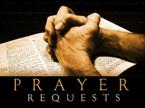
Prayer Request List
Updated Weekly
(click to view)

Calendar of Events
(Click to view)

Birthdays &
Anniversaries Calendar
(click to view)

Facilities &
Grounds
Calendar
(Click to view)


|
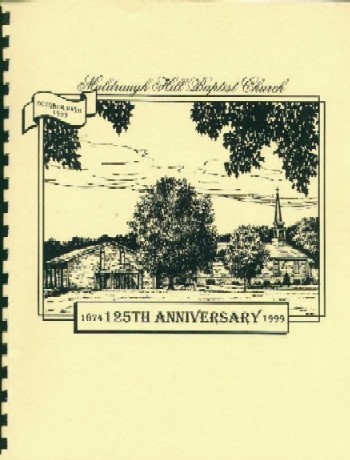
Muldraugh Hill Baptist Church History
The First 100 Years
(1874 - 1974)
uldraugh Hill Baptist Church, located in Lebanon, Kentucky, celebrated its 100th Anniversary October 27, 1974. In anticipation of this event, Irene Maupin, Emogene Farmer, and Barbara Jean Benningfield were assigned to compile a history of the church. We appreciate their time and effort in this endeavor.
The following information is what they compiled from church records and bulletins, associational minutes, the local newspaper (Lebanon Enterprise), personal interviews and other histories. This information is presented with the hope that it will recall many precious memories and renew an appreciation for the heritage of the church.
It is generally believed that Muldraugh Hill Church grew out of a Baptist church at New Market which was destroyed by a tornado in 1870. An article in the March issue of the Lebanon Clarion described the destruction caused by the tornado. The following story is printed as it appeared in the newspaper:
HURRICANE AT NEW MARKET
Trees Uprooted, Fences Swept Away
and Houses Leveled with the Ground.
TWO CHURCHES IN RUINS
Great Destruction of Property
The village of New Market, six miles west of this city on the Campbellsville turnpike, was visited last Saturday by a terrible tornado. The ravages of the tempest were confined to a few moments of time and to a small district of country; but they were of such a character that none that saw them wish ever to see the like again. The amount of property destroyed was very considerable, and the exemption from loss of human life, in view of the violence of the storm, seems like a special Interposition of Providence.
BEGINNING AND COURSE
About five o'clock in the afternoon there came up a heavy shower of rain, which lasted only a few minutes, and was immediately succeeded by the hurricane. The storm began its work of destruction beyond the Rolling Fork, not far from the residence of Mrs. Eliza Schooling, uprooting trees, sweeping away fences and demolishing houses, until it reached the eastern limits of the village, where it divided, the principal portion rising and the remainder taking an eastern direction. The course of the tornado through the village was almost exactly on the line of the Lebanon and Campbellsville turnpike.
ATMOSPHERIC PHENOMENA
The tornado occurring in the daytime, its phenomena were attentively noted by a number of persons whose statements, taking into consideration their different standpoints, are remarkably consistent. A gentleman residing near the north-eastern limits of the village says that his attention was first attracted by a brillant light, apparently about the barn of Mrs. Massingale, which led him to believe for the moment that the building was on fire. It is hardly necessary to remark that, in such cases, men observe quickly and think fast. A moment later-in much less time than it requires to write it-he beheld a dark mass about the breadth of an average-sized house, with numerous bright intersecting lines not unlike chain lightning, and with a fiery-red border at the top. This same phenomenon was observed by others, and all testifying that it expanded and contracted as it proceeded on its way, the lines of light continually shifting, and the whole mass revolving, seething and boiling. At the bridge, just beyond the Presbyterian church; this mass was observed to pause and stretch out to the breadth of some thirty or forty yards, the base resting on the earth and the summit out of sight-then, as if having gathered fresh power from the delay, it swept up the slope, carrying every-thing before it.
PARTIAL LIST OF LOSSES
The barn, crib and stable of Mr. Samuel Roberson were blown down and a buggy torn up. The windows of his dwelling were broken by the wind.
A large barn belonging to Mrs. Massingale was destroyed, her carriage house blown over, and the carriage broken.
The smoke-house of Mr. David Walker was torn to pieces, his stable unroofed, crib blown down, and the top of the L part of his dwelling carried away. A rockaway standing in the yard was lifted some 15 feet into air, turned over, dashed to the ground and broken.
The windows of Mrs. Lizzie Newcomb's residence were blown out and the chimney broken off. Her stable was blown and a wagon broken. A blacksmith shop owned by Mrs. Newcomb, was occupied by George and Matt Mobley, was blown down.
Mr. Ed. Luckett had a barn and two cribs torn to pieces, and lost several stacks of hay and 3000 bundles of fodder.
The L part of the dwelling of Thomas Hicks was unroofed, the front portion lifted up and moved several feet and a chimney broken off. His wagon shed was torn to pieces and the upper part of his stable and crib carried away.
The smoke-house and buggy-house of H. H. Carter were lifted out of their places and moved some distance, his crib unroofed, and a shed blown down. A small quantity of queensware in his store was dashed from the shelves and broken. The walls of his dwelling were sprung, the glass in the windows broken and the tops of the chimneys blown off.
The L portion of Mr. Wayne Ferguson's house was blown down, as was his smoke-house. Two poplar planks and a piece of fence rail were driven through the front portion of his house, from end to end, coming out on the other side. His hen-house was torn to pieces and the chickens blown so far away that they have never been heard from.
Mr. Jacob Miller was one of the heaviest losers. The L portion of his brick dwelling lost the whole of the second story, his kitchen was utterly destroyed, his corn crib and two barns blown down and two valuable horses killed. Every sash and pane of glass in his dwelling was broken and a large quantity of wearing apparel and several beds blown away. A store-house adjoining his residence, containing tobacco and other articles, were destroyed. His loss will amount to thousands of dollars.
The second story and roof of a house belonging to heirs of William Smith, deceased, until lately occupied by John Mobley, was forced down into the first.
The dwelling-house of Mr. George Meese was lifted up and moved forward some eight or ten feet, the entire front and roof torn off and hurled away. The kitchen adjacent was lifted up and dashed against a tree near by, which prevented it from being carried off. The tree was bent low by the force of the blow, but gallantly held its position. A considerable quantity of clothing belonging to the members of Mr. Meese's family was carried away and almost all of the kitchen furniture destroyed.
THE CHURCHES
The village contained two churches, a brick church belonging to the Baptist denomination, and a frame church owned by the Presbyterians. The Baptist church, in the lower part of town, was about to receive a new roof, for which purpose two large piles of shingles had been deposited near it. One of these was hardly disturbed, while the other scattered to the winds, some of the shingles being carried six miles. The church itself was an utter wreck. With the exception of one corner, of which some eight feet in height remained, the whole edifice was leveled with the ground. The joists, thirty feet in length, were blown in every direction, and some of them forced eight or ten feet into the ground. Nearly all of the larger monuments in the churchyard were broken to pieces. The railing about one of the graves whirled away to an unknown distance, not a splinter being left behind. Another enclosure had about it a fence surmounted by heavy rocks, which were bound together by strong iron bands. Several of these rocks were blown off and the iron clasps were wrenched or broken.
Upon reaching the frame church the storm seems to have attained its utmost fury. After a short pause in the valley below, it rushed up the slope and tore the church to splinters in a moment, scattering the fragments along the side of the road for several hundred yards. Nothing was left but the stoves, floor and some of the seats. Strange to say, the Bible and Sunday School library were not injured.
PERSONS INJURED
One of the most singular features of this tornado is the fact that no human life was lost. Sixty-three persons were in the immediate pathway of the storm, none of whom was fatally injured. Four of Mr. Jacob Miller's family received painful injuries from the falling bricks. Mrs. Thomas Hicks was considerably hurt. Tommy Carter was bruised severly by flying fragments, and his left arm was disabled for the time. Mr. Thomas Taylor was also somewhat injured by a missile of some kind. Various other persons received slight wounds.
INCIDENTS
The bridge over the branch near Mr. Miller's consisted of stout oak puncheons, 20 feet long, eighteen inches in width and two inches thick, which were blown from thirty to two hundred yards, and some of them torn to splinters. One of these puncheons was carried a distance of one hundred yards and cut down a fruit tree in front of Mr. Meese's house.
Some of the members of the family of Mr. John Sanders were repeatedly blown into the fire, and it was with great difficulty that they were prevented from burning to death.
In the back yard of Mr. Meese there is an excavation, eight or ten feet deep, used as a milk-house. To this, on the approach of the storm, Mr. Meese retired with his family, and to this precaution they are probably indebted for the preservation of their lives.
The storm appears to have moved very slowly. Mr. Miller was in his barn and saw it approaching at a distance of something like a hundred yards. He had time to run from one end of the barn to the other and get out before the storm struck it.
A lady's dress was seen to shoot rapidly upward to the height of several hundred feet and sail off. It was thought at the time by the spectators that the lady herself was in it, but fortunately this was not the case.
Singles, fodder and many other small articles which evidently came from New Market, were found on the farm of Stephen Raley, six miles distant from the point from which they started. Mr. Henry Abell, who lives somewhat nearer to New Market, says that a wagon load of such fragments might have been collected from one of his fields.
The head of an Opossum, evidently recently severed from the body, was found lying in the road, near Mr. Sam Roberson's residence.
The bell of the Presbyterian church was carried some two hundred yards.
Some persons residing not more than twenty to fifty yards of the track of the hurricane, were not aware that anything unusual was transpiring, and were quite astonished when their attention was called to the wreck and ruin so near them.
SUMMARY
It is estimated that, exclusive of a number of small out-buildings, 34 or 35 houses were blown down or badly injured. All the fencing and nearly all the fruit trees in the village vanished before the breath of the Storn-King. On Sunday morning the whole face of the country was covered with DEBRIS, and the principal street was filled and obstructed by rails, planks, and fragments from the ruins. Some of the damage has already been repaired, but months, and perhaps years, must elapse before the place will entirely recover from the effects of this visitation of Providence.
RELIEF FOR THE SUFFERERS
The losses entailed by the hurricane fell very heavily upon some of the citizens of the unfortunate village. We are glad to know that a vigorous effort has been made here to obtain contributions for their relief. We understand that a considerable sum has already been realized, but much remains to be done. Contributions of money or other needed articles will be received by Rev. V. E. Kirtley, who has been very active in his endeavors in behalf of these unfortunate persons. We sincerely trust that no one who is able will refuse to contribute to so worthy an object.
|
Little is known about the age of the New Market Church, except the name does appear in records as early as 1856. On September 22, 1856, New Market Church was dismissed from Russell Creek Association and entered the Lynn Association organized November 8, 1856. The church entered that association on that date with 79 members. In the 1859 minutes of Lynn Association, New Market is listed with 71 members.
A deed was drawn for the ground where Muldraugh Hill Baptist Church is presently located on February 3, 1873 with Nathan and Elizabeth Sapp as grantors of the deed. The deed, as written in 1873, is as follows:
This Indenture made this 3rd day of February 1873 between Nathan Sapp and Elizabeth Sapp, his wife, as party of the First part and Thomas Underwood in trust for the use and benefit of the United Baptist Church of Christ as party of the second part Witnesseth. That the parties of the first part for and in consideration of ten dollars to them in hand paid hath bargained and sold and by these presents doth grant bargain and sell and convey to the party of the second part for the use aforesaid a tract of land lying in Marion County on the Campbellsville and Lebanon Turnpike road which is bounded as follows: Beginning at a Sassafras Walnut and Maple on said pike corner to Mr. Livers fence with the pike in the direction of the Rolling Fork 22 poles to a white oak at the end of a ditch cut in a pond on the pike fence East along said ditch 7 poles to a stake then South ll-2 poles to a Spanish Oak and dogwood comes to said Livers fence North 55 west with the line of said Livers 18 poles to the beginning. To have and to hold the said tract of land with the appurtenances to the said party his heirs and assigns for the use of said church forever with covenant of Special Warranty Witness Our Signature this the day and year first above mentioned.
Nathan Sapp
Elizabeth Sapp
Elizabeth Sapp is given as one of the charter members of the Church. However, the name of Nathan Sapp does not appear on the records until October 1887, when he along with several others was baptized.
Nathan Sapp not only granted the ground, but he and his son, Perry, were also instrumental in partial construction of Muldraugh Hill Baptist Church, as indicated by Perry Sapp's obituary which was in possession of John Hundley, son of the late Rev. W.C. Hundley.
The obituary states that William Perry Sapp was born in Marion County, Kentucky, on October 21, 1847, and died October 25, 1930, at the age of eighty-three years and four days. He was the son of Nathan and Elizabeth Vessels Sapp. He was married in 1867 to Susan Bright who died in 1887. To their union were born seven children: W. T. Sapp, G. A. Sapp, J. N. Sapp, Nannie Rice, Zennie Colvin, Carl Sapp, and Frances Horton.
The obituary says that William Perry Sapp united with Muldraugh Hill Baptist and was one of the oldest members at the time of his death. He and his father, Nathan Sapp, hewed the sills by hand and donated them to the building of the church. The obituary reads, "Brother Sapp was born-and reared in sight of this church and will now be laid to rest on a part of his home place where he spent his life."
Descendants of the Nathan Sapp family are among the membership of the Church today:
Descendants of W. T. Sapp are Mrs. Esther Allen and daughter, Norma Ray.
William (Billy) Veatch and his children, Estelle Veatch Brady and Bobby Veatch; David Veatch and his children, Donnie and Jeannie; and Bernard Veatch are descendants of George A. Sapp.
Descendants of John N. Sapp include Coy, Twyman, Marion, Sudie, Mildred, Mrs. Nettie Sapp Colvin, Mrs. Mabel Sapp Yates, Terry and Steven Yates.
Descendants of Frances Sapp Horton are J. D. Horton, Dorothy Horton Bishop, and Frances Horton Thompson.
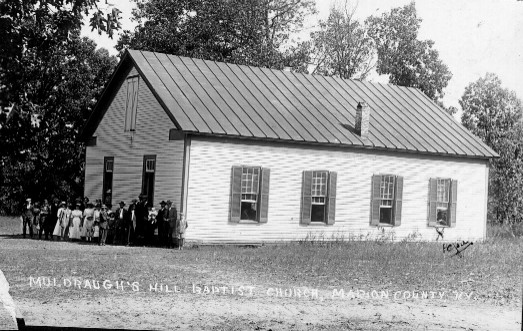 The dedication of Muldraugh Hill Baptist Church was announced in the Lebanon Weekly Standard on October 13, 1874 by W. L. Ramsey. The article appeared as follows: The dedication of Muldraugh Hill Baptist Church was announced in the Lebanon Weekly Standard on October 13, 1874 by W. L. Ramsey. The article appeared as follows:
New Market, Ky., Oct. 13, 1874. Correspondence of the Standard.
Please announce through your paper that the new Baptist Church near the foot of Muldrough's Hill, on the Lebanon and Campbellsville turnpike, is nearly
completed. It will be called the Muldrough's Hill Church. The first or introductory sermon will be preached by the writer,
on the fourth Sunday in this month at eleven o'clock, and all the members of the old New Market church are requested to meet
there on that day at 10 o'clock A.M. The church will be constituted on Saturday before the first Sunday in November, and will
be dedicated on the first Sunday in November. The sermon will be preached by Rev. Henry McDonald, of Georgetown, Ky.
W. L. Ramsey
|
The dedication of the church took place November 4, 1874, with Rev.
Henry McDonald preaching the sermon.
Henry McDonald, D.D. was raised up to the ministry, and labored a
number of years, within the bounds of Russell Creek Association. He is a
native of Ireland, was raised by devout Catholic parents, and was educated
with a view to the priesthood. Being averse to becoming a priest, he ran
away from his parents, and came to the United States. Making his way to
Greensburg, Kentucky, he entered upon the study of law, under Hon. Aaron
Harding. Under the preaching of B. T. Taylor, during an extensive revival
at Greensburg, young McDonald professed conversion, about 1852, and was
baptized into the fellowship of Greensburg church, by Mr. Taylor. He at
once abandoned the study of law, and commenced the study of theology, under
the directions of John Harding. He was ordained to the ministry, about
1854. After serving the church at Greensburg, some ten years, he accepted
a call to Danville, where he ministered about twelve years. From thence he
went to Covington, where he remained only a few months, when he accepted a
call to the church at Georgetown, where, in addition to his pastoral labors,
he filled the chair of theology in Georgetown College.
A brief historical sketch of "Muldraugh's Hill Church" is in the minutes of the Russell's Creek Association for 1880 on page 7:
HISTORY OF MULDRAUGH'S HILL CHURCH
This church was constituted with thirteen members, on Saturday before the first Sunday in November, 1874, in a new church building costing $1500 dedicated on Sunday by a sermon by Bro. McDonald.
A pastor was called on that day, and Bro. Thomas Underwood chosen, who continued his ministration from 1874 until 1879. During the five years in which Bro. Underwood acted as pastor, the church was in a flourishing condition, and at the time he left the church numbered 121 members.
Within this time, however, a great many letters were granted. The first deacons of the church were W. W. Rafferty and E. C. Wise. Afterward Bros. William Faucett and D. Walker were added. And Bro. W. F. Cowherd was ordained August 1, 1878. Bro. Porter Rafferty was our first clerk, serving in that capacity for three years. Bro. D. Walker acted as clerk for one year and was followed by Bro. Moses Farmer. At the expiration of his term, Bro. Wat Richeson assumed the duties, and he is clerk at the present time.
Muldraugh's Hill Church is the outgrowth of the efforts of the Home Mission Board, of Russell's Creek Association, Bro. Thomas Underwood acting as missionary by direction of the Board. The brother canvassed the territory and secured the means for the purchase of the beautiful location and the erection of the church edifice, which is a handsome building, 36 by 54 feet in size, well finished, and paid for. There is a well in the yard. Bro. Underwood spared no pains nor labor in the work, riding all over the territory and superintending in person all the business, for all of which we hope he will have his reward in the world to come. He has been a good and faithful minister in this part of the vineyard, and had it not been for his zeal in the cause, the church in all probability would never have been built.
Records of 1874 through 1878 were burned in the home of the church clerk, Porter Rafferty, whose house was destroyed by fire. For this reason we have two conflicting lists of charter members.
In 1901, 25 years after the church was organized, Bro. J. L. Collins and Porter Rafferty were appointed to prepare a list of the charter members of the church. This list includes:
- Bro. J. C. Benningfield
- Bro. E. C. Wise
- Sister J. C. Benningfield
- Bro. S. T. Wise
- Sister Elizabeth Abell
- Sister Mary E. Wise
- Sister Elizabeth Sapp
- Bro. W. W. Rafferty
- Sister Prissalla Thompson
- Bro. J. W. Rafferty
- Sister Maggie McDemar
- Bro. Porter Rafferty
- Bro. Richard Nolley
Another list which was in the possession of Mary Stockman Burrice, who was
baptised August 11, 1896, reads:
- Mr. & Mrs. J. C. Benningfield
- Mr. & Mrs. Peter Abell
- Mr. & Mrs. Jake Miller
- Mr. & Mrs. Ward Rafferty
- Mrs. Lucy Carter
- Mr. Richard Nolley
- Mr. Perry Sapp
- Rev. & Mrs. Thomas Underwood
ARTICLES OF FAITH
AS ADOPTED BY MULDRAUGH CHURCH
AT HER MEETING OF ORGANIZATION
(NOVEMBER 14, 1874)
- lst We believe there is only one true and living God whose name Jehovah The Maker and Supreme ruler of heaven and earth. Inexpressibly glorious in holiness worthy of all possible honor confidence and love revealed under the personal distinction of Father Son and Holy Ghost or Spirit Equal in Every office in the great work of Redemption.
- 2nd That the new and old Testament is the infalable word of God and is perfect treasure of heavenly instruction. That it has Salvation for its End and truth without mixture of Error for its matter. That it reveals the, principals by which God judges and therefore is and shall remain to the End of the world - the true center of Christian union and the Supreme Standard by which all humane conduct creeds and opinions should be tried.
- 3rd That man was created in a state of holiness under the law of his maker. But by voluntary transgression fell from that holy and happy state in consequence of which all mankind are now sinners not by constraint but choice. Being by nature utterly void of that holiness required by the law of God wholly given to the gratification of their own sinful passions and therefore under just condemnation to eternal ruin without difference or excuse.
- 4th That the Salvation of Sinners is wholly of grace through the mediatorial office of the Son of God who took upon himself our nature yet without Sin honored the Law by his personal obedience and made atonement for our sins. By his Death Being risen from the dead he is now in heaven and uniting in his wonderful person the tenderest Sympathies with the divine perfection in Every way gratified to be a Suitable - Compassionate and all Sufficient Saviour.
- 5th That the great gospel blessing which Christ in his fullness bestowed on Such as believe on him is Justification. That Justification consists in the pardon of Sin and the promise of Eternal Life on principals of righteousness that is bestowed not in consideration of any works of righteousness which we have done. But solely through his own redemption and righteousness that it brings us into a State of most blessed peace and favor with God and Secures Every Other blessing needful for time and eternity.
- 6th That the blessing of Salvation are made free to all by the gospel. That it is the immediate duty of all to accept them by a cordial and obedient faith. And that nothing prevents the Salvation of the greatest Sinner on Earth except his own voluntary refusal to submit to the Lord Jesus Christ which rejection will subject him to an aggravated condemnation.
- 7th That in order to be Saved - we must be regenerated or born again that regeneration consists in giving wholly disposition to the mind and is effected in a manner above our comprehension or calculation by the power of the Holy Spirit. So as to secure our voluntary obedience to the gospel. And that its proper evidence is found in the holy fruit which we bring forth to the glory of God.
- 8th That such only are real believers as Endeavor to the End that their perserence Attachments to Christ is the ground work which distinguished them from mere professors. That a special providence watches over these wellfare and they are kept by the power of God through faith unto Salvation.
- 9th That the law of God is the eternal and unchangeable rule of his moral government that it is wholly just and good and that the innobility which the Scriptures asscribe to follow man to fulfill its precepts arises entirely from their love of Sin to deliver them from which and to restore them through a mediator to obedience of the holy law is one great end of the gospel and means of grace connected with the establishment of the church.
- 10th That a visable church of Christ is a Congregation of Baptist believers associated by Covenant in the faith and fellowship of the gospel. Observing the ordiance of Christ government by his laws and exercising the gifts, rights, and privileges invested in them by His word. That its only proper 0fficers are Bishops or fathers and Deacons as defined in the Epistles of Timothy and Titus.
- 11th That Baptism and the Lord's Supper are ordiances of the Church. That Baptism is immersion of a penitent believer in water in the name of the Father, Son, and Holy Spirit by the authority of a church and always preceeds the Lord's Supper. That the Lord's Supper is the use of Bread and wine to set forth the Sufferings and Death of Christ proceeded by a solemn Self Committal.
- 12th That the first day of the week is the Lord's day or Christian Sabbath and is to be kept Sacred to Religious purposes by abstaining from all secular labor and recreation by the observance of all the means of grace both private and public and preparation for that rest that remaineth for the people of God.
- 13th That there will be a resurrection of the Dead both of Just and the unjust. That there will be a general judgement. That there will be a separation of the righteous and wicked and that the happiness of the Righteous and the punishment of the wicked will be eternal.
CHURCH COVENANT
FOR THE UNITED BAPTIST CHURCH OF JESUS CHRIST
AT MULDRAUGHS HILL
MARION COUNTY, KENTUCKY
AS ADOPTED AT ITS ORGANIZATION
(NOVEMBER 14, 1874)
As we trust we have been brought by divine grace to embrace the Lord Jesus Christ and by the influence of his spirit to give ourselves up to him so we do now solemnly covenant with each other that God enabling us we will walk together in Brotherly Love that we will exercise a Christian care and watchfulness over each other and faithfully warn rebuke and admonish one another as the care shall require. That we will not forsake the assembling of ourselves together nor omit the great duty of prayer both for ourselves and for others. That we will participate in each others joys and endeavor with tenderness and sympathy to bear each others burdens and sorrows. That we will constantly endeavor to bring up Such as may be under our care in the nurture and admonition of the Lord. That we will seek divine aid to enable us to walk circumspectly and watchfully in the world denying ungodliness and every worldly lust. That we will strive together for the support of a faithful, evangelical ministry among us. That we will endeavor by example and effort to win souls to Christ and through life amidst evil report and good report seek to Live to the glory of Him who hath us brought out of darkness into His marvelous light.
RULES OF DECORUM
FOR THE
UNITED BAPTIST CHURCH OF JESUS CHRIST
AT MULDRAUGH HILL
- lst The Church shall meet for the transaction of business on Saturday before the first
Sunday in each month at 11 o'clock A.M.
- 2nd The Church shall have a presiding officer called a moderator whose duty shall be to call the church to order and put all questions that come up by motion and second to the church by voting and in case of a tie give the casting vote but he shall not be allowed to vote in any other case.
- 3rd No member shall have the right of more than three speeches to one question without permission from the church, arising from his seat and addressing the moderator.
- 4th No member following the one who has spoken shall cast any reflection on his speech.
- 5th No member shall call any member by any other term or affiliation except brother or sister.
- 6th All private offenses shall be treated according to the 18th chapter of Matthew.
- 7th All public offenses shall come before the church by the appointment of a committee whose duty shall be to go to the offender and request them to come to the church and make their acknowledgements or defense.
- 8th No member shall have the right to leave church during its session of business except by permission of the moderator.
- 9th There shall be no whispering or talking during the conference of the church.
- 10th All questions shall be decided by a majority of votes cast except in the reception of members when it shall be unanimous.
- 11th No questions shall be debatable or ready for discussion except coming up by motion and second.
- 12th Appointment of Committee.
- 13th It shall take no less than five members to form a forum to transact business of the church.
- 14th In order to defray the expenses that each male member over the age of 21 pay $2.00 and each male member under the age of 21 years pay $1,00 and each female over the age of 21 years pay $1.00 and each female under the age of 21 years pay 50 cents and the rest of the expenses be paid according to what we are worth and a failure to do this we forfeit our membership.
- 15th It shall be the duty of the church to open her doors for the reception of members
before the close of the session.
In September 1879 Rev. E. H. Brookshire was called to serve as pastor. On Saturday before the fourth Sunday in December 1879, by motion and second, the church agreed to take Bro. Kerkendall to preach one-half of the time for Bro. Brookshire. This continued for a period of about 10 months.
Immediately upon the resignation of E. H. Brookshire, J. C. Wray was called as pastor in November of 1883. Financial problems plagued the church, which possibly was the reason for Bro. Wray's short ministry.
The pastor's salary per year depended upon the amount of money the members contributed, although the pastor usually asked for a set salary ranging from $100.00 to $250.00. The sexton's salary was from $9.00 to $15.00 per year.
Usually a committee of three people was elected to raise subscriptions (money pledged) for the pastor's and sexton's salaries and mission causes. Money raised in this manner was not always sufficient for the needs. Once the church considered imposing an advalorem tax on itself. That the church was hard pressed for funds is evident when on one occasion they decided to "go to the law" to see if they could get Bro. Newton to pay what he owed the church.
The sexton or housekeeper had to furnish his own supplies such as oil for the lamps, brooms, and wood for fires. Besides cleaning the church building, the sexton was also responsible for the upkeep of the racks that were put around the fence for a hitching post.
There is no record of any business meetings between July 1884 and April
1885.
Realizing the struggling condition of the church, Bro. Thomas Underwood accepted the pastorate for the second time.
In 1885 the July minutes of the church read as follows:
Saturday before the lst Sunday in July, church met in regular order for the transaction of business. Bro. T. R. Farmer was called to the chair as moderator. The committee consisting of the deacons of the church reported they had concluded the church pledge themselves to pay Bro. Underwood $50.00 for his services the ensuing year and all money paid by persons not members, he receives in addition to the $50.00. Moved and seconded the report be received and the committee discharged. Motion carried. Moved and seconded the church pledge themselves to pay the amount as suggested by the deacons. Motion carried. Bro. Underwood accepted the call of the church.
The following persons agreed to pay the following amounts on pastor's salary:
| Bro. Mills |
$2.00 paid |
Sister Mike McDemar |
$5.00 paid |
| Bro. Lake | $5.00 paid |
Mollie Hardin | $5.00 paid |
| Wm. Hardin |
$1.00 paid |
Elizabeth Richardson |
$3.00 paid |
| E.C. Wise $3.00 |
paid | George H. Phillips |
$5.00 |
| Bro. Colvin |
$2.00 | Mrs. C. Russell |
$1.00 paid |
| Robert Wise |
$1.00 | George W. Moore |
$1.00 |
| Bro. Nawley |
$1.00 paid |
John Thomas Farmer |
$0.25 |
| Mrs. Fulks |
$1.00 paid | Geo. Battcher |
$0.25 |
| Mrs. Lake | $1.00 paid |
John White | $1.00 |
| Mrs. Short |
$1.00 paid |
Taylor Abell | $3.00 |
| D. Cowherd |
$2.00 paid |
Thomas Hardin | $3.50 |
| Mr. Abell | $5.00 paid |
John L. Collins |
$3.00 paid |
| Sister Mills |
$1.00 paid |
Sister Riceson |
$5.00 |
| Sister Sapp |
$0.50 | W. D. Bright |
$1.00 paid |
| J. D. Maupin |
$0.50 | Sister Putman |
$1.00 paid |
| John Gibson |
$0.25 | Sister Putman |
$1.00 paid |
| Edmon Riggs |
$0.25 |
|
T. Farmer
G. H. Phillips, Clerk Pro Tem.
An exerpt from the Lebanon newspaper reads:
New Market - September 14, 1885
Rev. Thomas Underwood, assisted by Rev. V. E. Kirtley, has been conducting a series of meetings at Muldraugh's Hill Church, resulting in 11 accessions. The baptizing took place at the river on Friday. Mr. Kirtley is an able divine, and has greatly endeared himself to this people.
Less than a year later, upon the resignation of Bro. Underwood, Rev. V. E. Kirtley, in August of 1886, accepted the call of the church to preach twice monthly (lst and 3rd Sundays) for a salary of $200.00.
The automobile was practically non-existent in the late 1800's. Before people had automobiles to drive, they generally walked or traveled by horseback or some kind of horse-drawn carriage. One naturally concludes then, that transportation and weather conditions at this time greatly affected church attendance. In fact the records of April 1887 state:
Saturday before the lst Sunday in April 1887, the church met and after preaching by the pastor, the church became organized for the transaction of business.
There being no reference from last meeting and as the weather and roads having been bad through the winter. In consequence of which the congregation has been small and the clerk having been absent, we are minus a record since September. On motion and second it is ordered that the minutes of this meeting show that the State meeting since September has been attended by the pastor and that Bro. C. F. Putman put in his membership with this church at the September meeting and that Bro. Charley Russell united with church at the January meeting. Motion and Second to adjourn.
V. E. Kirtley, Moderator
J. L. Collins Clerk Pro Tem
In connection with transportation by horseback or carriage, an amusing incident was related to the committee by almost every older person with whom they talked:
One Sunday morning a Mrs. Lucy Carter rode in her Phaeton to church, hitched her mare and went inside. While the worship services were in progress, the mare gave birth to a colt, a scene visible to the whole congregation through the church windows. Mr. Wash Moore came to the aid of the poor animal, releasing her from the carriage and rendering such assistance as necessary.
Afterwards, someone remarked, "It would surely be a good horse for it was born at a good place on a good day."
In a "History of Kentucky Baptists" by J. H. Spencer he states the protracted meeting became a feature of the polity of the Baptist church as far back as 1837. Hitherto, even during revival seasons, meetings were held only on Saturday and Sunday with an occasional night meeting, and that usually met at a private home; and the most zealous enterprising minister could not stretch his conscience beyond a 3 day meeting. But now the meetings began to be pro-tracted from day to day during a period of two weeks.
When the revival season passed the church continued to meet once a month,
have Saturday and Sunday preaching, and exercise strict discipline over its
members. But there were few additions to the church by experience and baptism
"till another revival season came around and after the church would be much
diminished in numbers by death and exclusion."
In September 1887 Dr. A. C. Graves assisted Bro. Kirtley in a protracted
meeting at Muldraugh Hill described as "a joyous revival of religion."
A protracted meeting is discussed by Rev. V. E. Kirtley in a letter to
the Russell's Creek Association. It is unknown when Muldraugh Hill joined the
Russell Creek Association.
Letter to the Russell's Creek Association from United Baptist Church of
Jesus Christ at Muldraughs Hill in Marion County, Kentucky. To the Russell's
Creek Association when convened with East Fork Church in Metcalf County, Kentucky
in September 1887 is as follows:
Dear Brethering
Since we last wrote you we have reason and we trust feel to thank God for his love and mercies and kind dealings with us through the past years. True we have not enjoyed the blessings of the Lord as it has been our privelege to do or as we might have done and death has claimed and taken from our number several of our beloved brothers and sisters in Christ (members of our church) and among the number is one that you have often met and counseled with in your association and that many of you have heard preached the Word of God that he doubtless proved the power of God to the saving of your own souls and will still prove that power to all that will yet believe that preached word.
We mourn for our beacon light has gone-the Time Honored Servant of God that founded this church and spent his last with us has gone to his reward. (Bro. Underwood)
But we have had Bro. V. E. Kertley to preach for us twice a month through the past year and the Rev. Dr. Graves to assist him in a series of meetings which is now about to close and results in great good. Our membership has been very much received. We have had forty-nine (49) conversions and forty-seven (47) will be baptized tomorrow and four (4) have joined by letter. God will be praised for his blessings. Pray for us Brethering that we may ever enjoy the love and grace of God in our hearts and that our efforts may be to advance the interest of His cause and kingdom in the earth. Failing to get a volunteer we send no one to sit with you in your councils at this session. We trust your wisdom and council.
Our membership now stands as follows:
Males 67
Females 88
Total 155
Lost since our last report are 7 by death, 7 by letter and 16 by revision of list.
V. E. Kirtley moderator
J. L. Collins Clerk Pro Tem.
New converts that were added as the Blessing and results of the series of
meetings mentioned in letter above were:
By Baptism:
- Alice Hicks & Wife Loutisha Hicks
- James Cooper & Wife
- Sam R. Yates & Wife
- Ignatious Wise & Wife
- James Jacobs & Wife
- Parker Wise & Wife
- Joff Maupin & Wife
- Parker Wise & Wife
- John Benningfield & Wife
- Annie White
- Sam R. Newcomb & Wife
- Maggie Benningfield
- George Sturgeon
- Abraham Wise
- Wm. White
- Mattie Newcomb
- Richard Wise
- Reubin Benningfield
- Jessie R. Acre
- Mrs. J. D. Maupin
- M. H. McElroy
- Effie Russel
- John T. Farmer
- Loula English
- Wm. Waide
- James Russell
- John S. Wise
- Iva Allen
- Nathan Sapp Sr.
- Annie Farmer
- Willie F. Harding
- Nora Lake
- Artimecie Harding
- Cara Fuiks
- Fannie Allen
- Miss Rury Hayland
- Annie Bell Russel
Others mentioned:
- Andrew Jacobs, restored
- Tolipha Jacobs, by letter
- Vester Malcone, watch care
- Mrs. Malone, by letter
This is the first mention of Nathan Sapp's name on record after giving the
ground for the church site.
Under Bro. Kirtley's leadership the church seemed to progress financially as well as spiritually.
In July, 1888, the church met to call a pastor and adopt a system for raising finances for salaries and church expenses. A committee was appointed to solicit subscriptions to pay the pastor--one-fourth of said subscription to be paid in advance and the remaining three-fourths due every successive three months. E. H. Brookshire was again called as pastor, if he could not accept, a call would be extended to Bro. J. H. Rife. If he would not accept, a third call would be made to C. M. Reed of Lancaster, all for once-a-month. The salary was to be $120.00 for 12 months.
At the August meeting of 1888, Bro. Brookshire stated that if 12 of the bretheren would guarantee him $120.00 and give him what he could get, he would preach, or if the church would give him $120.00 and pay him $100.00 the next meeting, he would take a chance on the balance.
Apparently, the chances were not good, for Bro. J. H. Rife made an appearance at the December meeting of 1888 and gave this reply concerning the call of the church. He stated he could preach "for the church" or "to the church", if the church wanted him, but if he preached, he wanted to preach "to the church", as he much preferred to preach "to a church" than "for a church". He requested that if anyone of the church did not mind him or was not willing to cooperate with him, he hoped they would manifest it then by rising, by proxy, or any way to express their feelings, and that he would take no exceptions at anyone so expressing themselves. He waited a moment to hear from anyone. He wanted and hoped that if there were no objections offered now, that there would be none hereafter, and that he might have the cooperation of all. After no objections were offered, Bro. Rife said he accepted the call of the church.
In order for the pastors to fulfill their responsibilities at other churches, meeting dates were often changed. The early church records reveal the church meeting once each month. Besides the usual Sunday morning service, the church met on Saturday for business, during which time the doors were opened for membership. The business meeting was preceded with a sermon by the Pastor.
Until this time, Muldraugh Hill Church had been affiliated with Russell Creek Association. On Saturday before the third Sunday in October, 1889, a motion and second carried that a committee be appointed to carry the letter of withdrawal from that association to the new association to convene at Bethlehem Church in Washington County, with full power to join said association or return said letter as they may think best. Bros. C. F. Putnam, B. L. Russell and J. L. Collins were appointed as said committee. This committee, at the business session of November, 1889, stated that they joined the new association under the name of Central Association of Kentucky. This church has remained in this association to the present day.
Bro. Rife refused the call for a second year because the church was unable to collect the money pledged for the pastor's salary in 1889.
In January 1890, Bro. William Stallings was elected by a unanimous vote to be the next pastor. Bro. Stallings stated that he did not expect to be called, because nearly the entire membership of the church were strangers to him. He said he would accept the call on condition that the church would cooperate with him in the work and make him a salary of $120.00.
At a business meeting on Saturday before the third Sunday in May, 1891, upon the suggestion of the moderator (Bro. Wm. Stallings), it was moved and carried that the church covenant be read, and that as a means of renewing our covenant and revising our list of membership, that every member who is now and who may wish to remain members shall re-sign the covenant.
Names of members who re-signed the Covenant under act of the May meeting, 1891:
| Robert H. Shoftner |
W. L. Newton |
Sallie B. Bridgewater |
| Miss Lillie Turner |
Ellen Miskel |
W. G. Parsons |
| J. D. Nolley |
Annie Farmer |
James S. Colvin |
| Sarah Nolley |
Lucy Johns |
Effie Colvin Gebhart |
| J. D. Maupin |
Sarah Wise |
Francis Wharton |
| Matilda Benningfield |
Lucy J. Carter |
Atwell T. Harding |
| J. W. Colvin |
James Farmer |
Ed Farmer |
| James R. Russel |
J. C. Sapp |
Annie Parrott |
| Diannah Cowherd |
Mrs. Nannie Brockman |
Samintha Settles |
| Minnie Hayden |
James Jacobs |
Ellen Gebhart |
| Mary M. Sapp |
Sarah Benningfield |
Henry F. Miller |
| Amanda Wade |
C. W. Cowherd |
Moriah Russel |
| Trany A. Sapp |
Charlie Russel |
Margaret J. Farmer |
| Abe Wise |
Norah J. Lake |
Dennis Mills |
| Elizabeth C. Abell |
Jessie M. Russel |
John S. Wise |
| Thomas A. Benningfield |
Addle Sullivan |
Martha E. Mills |
| Bettie Nolley |
Ida Allen |
Linda Maupin |
| Fannie Allen |
Louisa E. Parsons |
Louis Cooper |
| John L. Collins |
B. F. Russel |
John T. Farmer |
| Russell Thompson |
Emaline Shoftner |
Rice Acree |
| Mary A. E. Graves |
Ellic Harding |
Russel Sapp |
| Sarah M. Newton |
Elizabeth E. Richeson |
Mattie E. Farmer |
| Sharlottie Benningfield |
Moses Farmer |
Debertha Wise |
| Louisa Brockman |
Janie Sapp |
Mrs. J. C. Benningfield |
| Sallie A. Brockman |
Mike McDemar |
Rura Jeffries |
| William Randyes |
William Harding |
Artinency Allen |
| Mattie J. Abell |
Dirby Newcomb |
Willard Cowherd |
| R. M. Wise |
Meecie Harding |
Linnie Carter |
| Richard Nolley |
Ruthie J. Colvin |
Sallie Garrett |
| Sarah A. Sapp |
Margaret White |
John H. Wise |
| F. T. Abell |
Annie Y. Abell |
Walter Burris |
| Maggie Benningfield |
Alice J. Harding |
Sophrona McNear |
| W. C. White |
Mary C. Russel |
Mary R. Newcomb |
| John E. Russell |
Allice Mardis |
Ermine Brady |
| Nannie Ermine Harding |
Mattie J. Burdette |
Pleasant Benningfield |
| Victoria Maupin |
Rubin Newcomb |
Mary D. Collins |
| Mary E. Harding |
Ignatious Wise |
Mathis G. Newcomb |
| Judson W. Russel |
Mary A. Wise |
W. J. Farmer |
| Almarinda Russel |
John A. Sapp |
Mary C. Newcomb |
| Abe Benningfield |
Annie M. Johns |
Nathan Sapp |
| Telipha Jacobs |
Lou Allen |
Margaret Malone |
| Thomas Benningfield |
Nancy Acree |
John Burdette |
| Nannie E. Nolley |
Sallie Hickey |
James Cooper |
| Annie White |
Elizabeth Sapp |
Lucy Allen |
| Loula M. Abell |
Elmira Miller |
Annie Polley |
| Margaret McDemar |
J. C. Benningfield |
Elizabeth Dabney |
| Stephen T. Harding |
Samuel Benningfield |
D. Parker Wise |
| John L. Collins, Jr. |
Nancy Benningfield |
Molly Malone |
| J. P. Sullivan |
Osker Colvin |
T. P. Jeffries |
| Mattie E. Harding |
Andy Jacobs |
Hettie Malone | |
| Hugh Burris |
Charley Nolley |
Addle Bright |
| Ignatious Gebhart |
Porter Rafferty |
Amanda Newcomb |
|
In 1892, Muldraugh Hill Baptist Church reported to Central Association a little advancement, but hoped to do better the coming year. They gave $5.00 to District Missions, $5.00 to Home Missions, $6.31 to Foreign Missions. There were 50 pupils enrolled in Sunday School with an average attendance of 25. The church extended a call to Bro. Stallings for the third year and upon his refusal,
Bro. J. T. Hall became the pastor in June of 1893.
On August 7, 1897, the Central Association met with the Muldraugh Hill Church for the first time. There were 11 churches in the association, and they reported 1,899 members with 7 Sunday Schools.
The first mention of any trustees of the church is made during Bro. Hall's ministry here. The trustees were J. L. Collins, S. T. Harding and Porter Rafferty.
Bro. J. T. Hall was our faithful pastor until his death May 5, 1905. He was laid to rest in Brookside Cemetery, Campbellsville, Ky.
Resolutions of Repect as written by Bro. J. L. Collins adopted by the church at its regular meeting, Saturday before the fourth Sunday in August, 1903:
Resolved first that whereas it has pleased Our Great Heavenly Father who doeth all things well, to call from us to his heavenly reward, our beloved pastor and brother, Rev. J. T. Hall, who departed this life on the fifth day of May, 1903 that we deeply mourn the loss of our beloved pastor and brother and rejoin only in the promise of our Blessed Savior that he has gone to enjoy a blessed reward for a useful life well spent in the service of the true and loving God and for the glory and advancement of His cause and kingdom in this world.
Resolved second that for the ten years Bro. Hall served us so faithfully as our pastor, that we knew him as a faithful, zealous minister of the gospel of Jesus. A true Christian gentleman and honest honorable and upright citizen, abounding in faith in Christ as the Saviour of sinful men and in the grace of God. Always either by precept or example exhorting his fellowman to thoughts and deeds of righteousness and usefullness. Surely his life is worth emmulation and his works will follow him.
Resolved third that we deeply sympathize with his bereaved wife and children in this time of trial and sore bereavement and commend his precepts and examples to them as worthy of their greatest consideration and imitation.
Resolved fourth that it is our hearts desire and prayer to God that when our unprofitable lives of trial and sorrow shall end on earth as individuals and as the visible church of God that we may all go and-be prepared to meet our brother and Saviour together in the shining courts of Glory.
Resolved fifth that a copy of these resolutions be spread upon our records, a copy sent to the bereaved family and a copy be sent to the Western Recorder for publication.
J. W. Crawley accepted the call to be pastor of the church at the August business meeting in 1903. In September, 1904, he was assisted in a protracted meeting by Bro. Sam Crawley. Those added to the membership at this meeting were:
| Raymond Gillum |
George Hudson |
Girty Polley |
| Lydia Newcomb |
Bertha Grahsm |
Willie Jacobs |
| Sallie Farmer |
George Newcomb |
Dorah Newcomb |
| Thomas Polley |
Sarah L. Lewis |
Nettie Graham |
| Mary S. Benningfield |
Ethel Jarboe |
Arthur Colvin |
| Martha Benningfield |
Essy Hay |
| Nannie Colvin |
Cora Shelton |
|
One of the chief items of business in early Baptist churches was the maintaining of proper behavior of its members. This was accomplished by a member reporting suspected misbehavior of another member. The accused was notified to come to church business meeting to defend himself, or confess his guilt and ask forgiveness. If the accused did not appear, a committee was appointed to visit him and report to the church. This often resulted in exclusion of the accused from the fellowship of the body. The accusations recorded in the minutes are swearing, drunkeness, fornication, adultery, dancing, "playing marbles on the Sabbath", unscriptural conduct, and failure to re-sign the covenant. The 1891 minutes of Central Association record 52 exclusions that year by erasure. However, this was unusual and perhaps not all of them were for the above mentioned reasons. Some of these were later restored to fellowship.
Church records for the period between October 1904 and August, 1923 cannot be located. Therefore, we can do little more than list the names of the pastors during that time.
Associational records indicate Rev. T. E. Ennis was pastor in the year 1912
through 1916. An older member recalls that he traveled by buggy and later by car from Greensburg, Ky.
The same records also show that A. R. Abernathy was pastor in the year of 1917, but lists no pastor for the years 1918 and 1919.
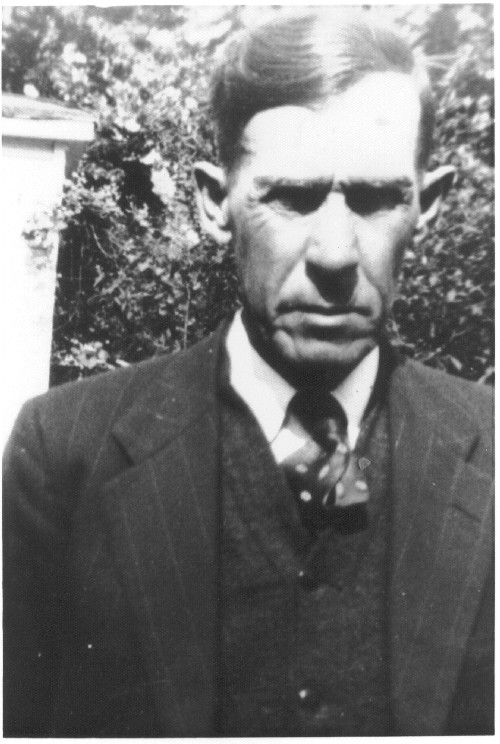 In 1920, W. C. Hundley became our pastor. Apparently, no church letter was sent to the association during the years 1921 through 1923. Therefore, we cannot definitely state that Bro. Hundley was pastor during this time. He does appear on the record again in 1924 as our pastor. He remained pastor until 1928. In 1920, W. C. Hundley became our pastor. Apparently, no church letter was sent to the association during the years 1921 through 1923. Therefore, we cannot definitely state that Bro. Hundley was pastor during this time. He does appear on the record again in 1924 as our pastor. He remained pastor until 1928.
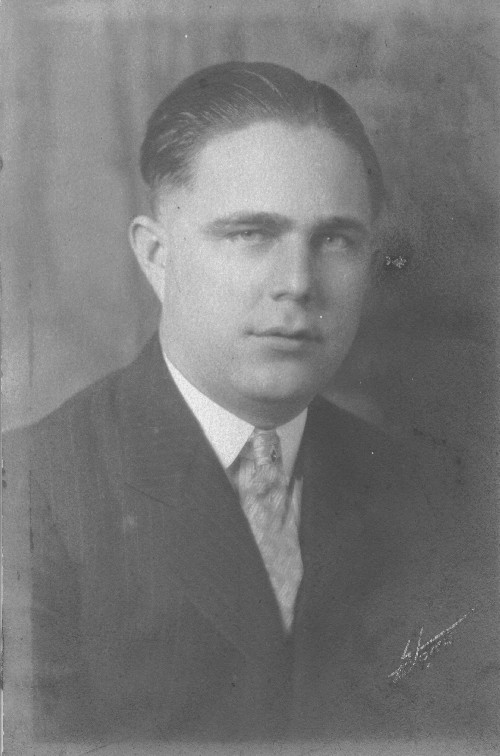 C. L. Harmon is given as pastor
from 1928 until 1929. Then W. C. Hundley is given as pastor again and he remained until 1932. C. L. Harmon is given as pastor
from 1928 until 1929. Then W. C. Hundley is given as pastor again and he remained until 1932.
It was under the ministry of W. C. Hundley that J. C. Raikes was licensed to preach the gospel, however, Bro. Raikes was ordained while Rev. Crit Harmon was pastor.
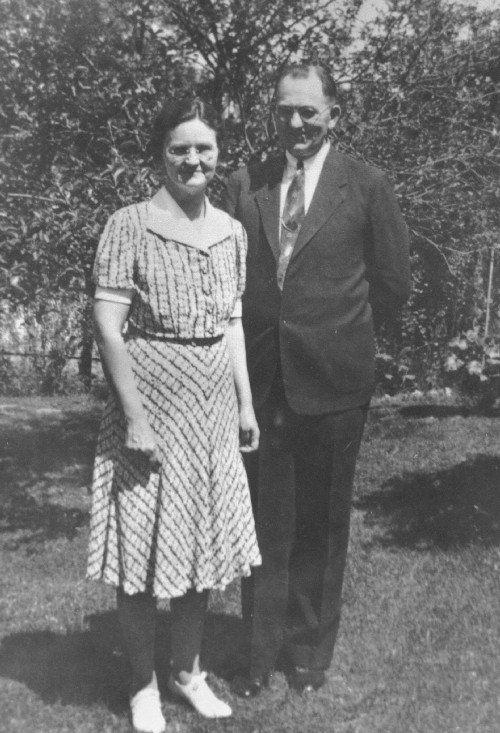 In 1932, L. E. Whitlow became the pastor. One of the greatest blessings the historical Committee received while working on this report was in visiting Rev. L. E. Whitlow at a Presbyterian Home for the aged at Beuchel, Ky. Although 94 years of age, he remembered vividly his years at Muldraugh Hill. He recalled each evangelist who served with him during revival periods. He laughingly remembered how he was showered for his efforts in the revivals with coops of chickens, half bushels of sweet potatoes (minus 2 lbs.), etc. In 1932, L. E. Whitlow became the pastor. One of the greatest blessings the historical Committee received while working on this report was in visiting Rev. L. E. Whitlow at a Presbyterian Home for the aged at Beuchel, Ky. Although 94 years of age, he remembered vividly his years at Muldraugh Hill. He recalled each evangelist who served with him during revival periods. He laughingly remembered how he was showered for his efforts in the revivals with coops of chickens, half bushels of sweet potatoes (minus 2 lbs.), etc.
Bro. Whitlow told of one deacon (Bro. Farmer) who gave him half a bushel of sweet potatoes, because he didn't want to overload his car, and promised the other half bushel later. The following year when they were again in a revival, Bro. Whitlow and the evangelist visited the home of this deacon. During their visit the evangelist expressed the feeling that the revival was not progressing as it should and wondered why. Whereupon, Bro. Whitlow jokingly replied he knew the reason why. Bro. Farmer had promised him a bushel of sweet potatoes a year ago, but had only given him a half bushel and it lacked two pounds being a half bushel.
After an establishment had been built near the church door for the sale of alcoholic beverages, the church, through Bro. Whitlow's leadership, petitioned it out.
He remembered and mentioned many of the members in the six years of his ministry here. While preaching for us the second and fourth Sundays, he was also pastor of Palestine Church, preaching there the first and third Sundays of each month. He made his home at Campbellsville, Ky. Total membership as shown on the new register June 24, 1938 was 326.
Bro. Whitlow sent this reply to the church shortly after receiving an offering from us:
November 7, 1957
Dear Members:
I was surprised, and greatly humbled to receive such a generous love gift from you. It sent many precious memories rushing through my mind back to the time when you honored me with the privilege of serving as your pastor.
"Brethren" I haven't the words with which to express my gratitude to you for this remembrance. Mrs. Whitlow joins me when I say, "Thank you. We covet your prayers."
Your true friend,
Rev. & Mrs. L.E. Whitlow
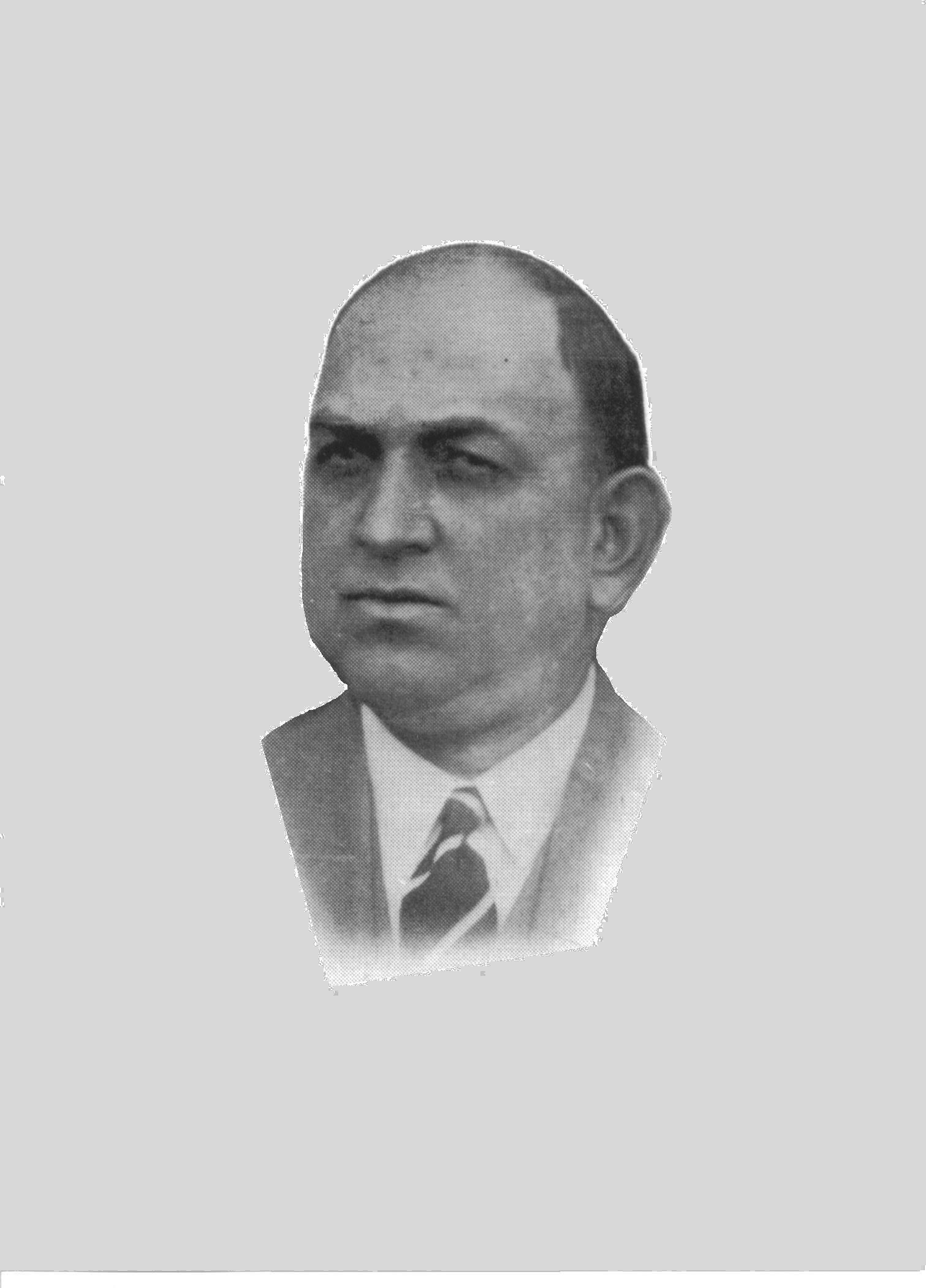
For the next 14 months, beginning October, 1938, Rev. E. M. Gash served as pastor. Little is known about Bro. Gash other than he had a son who also was a preacher.
%20Garnett%20E.%20Puckett.jpg) Rev. G. E. Puckett succeeded E. M. Gash in January, 1940. Several improvements were made on the grounds and buildings under his ministry. These general improvements consisted of papering, painting, replacing the roof on the church, two new doors, two new stoves, 100 hymnals, new flooring, and benches, as well as cleaning of grounds and cemetery. In 1942, the church purchased twelve Sunday School books to send to our men in the service and Mrs. J. P. Wade was authorized to make a service flag in their honor. Rev. G. E. Puckett succeeded E. M. Gash in January, 1940. Several improvements were made on the grounds and buildings under his ministry. These general improvements consisted of papering, painting, replacing the roof on the church, two new doors, two new stoves, 100 hymnals, new flooring, and benches, as well as cleaning of grounds and cemetery. In 1942, the church purchased twelve Sunday School books to send to our men in the service and Mrs. J. P. Wade was authorized to make a service flag in their honor.
Within the past decade a "carbide light plant" had been installed which was somewhat an improvement over the "coal oil lamps", but an even greater improvement was made when R.E.A. lights were installed in December, 1940.
Disposing of the "carbide light plant" posed to be a problem for an entire year. The plant was advertised in both Marion and Taylor County papers which resulted in no sale. Omer Caulk was granted the right to sell the complete light plant at a price not under $75.00. When he was unable to dispose of it at this price, an offer was made to trade a horse on the "plant." Motion and second was made for Bro. G. A. Sapp and Mance Moore to appraise the horse, which evidently was an unsatisfactory trade. The church lowered its selling price to $60.00 and later to $50.00. Finally in desperation the church offered the plant for sale at public auction to members of the church. Minutes of December 28, 1941 record the sale of the entire plant and building for $71.25.
Bro. Puckett served Stewarts Creek Church in Marion County as well as Muldraugh Hill during 1940-1942 and resigned September 10, 1944 to accept the First Baptist Church at Jeffersontown.
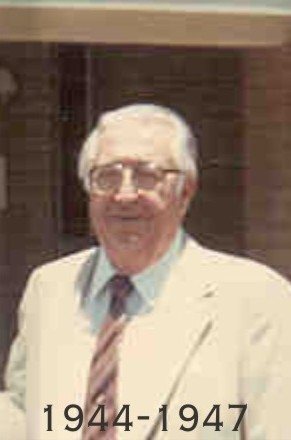 October 15, 1944, the church called John T. Pierce as pastor for an indefinite period of time instead of yearly. At this time the church voted to go to full time preaching and weekly Wednesday night prayer meetings as soon as Bro. Pierce came on the field. Since he was the first full-time pastor, the church felt a need for a pastorium. The property adjoining the church was purchased from Mr. and Mrs. Robert Maupin for the sum of $2850.00 in 1945 and was debt free by February, 1947.
October 15, 1944, the church called John T. Pierce as pastor for an indefinite period of time instead of yearly. At this time the church voted to go to full time preaching and weekly Wednesday night prayer meetings as soon as Bro. Pierce came on the field. Since he was the first full-time pastor, the church felt a need for a pastorium. The property adjoining the church was purchased from Mr. and Mrs. Robert Maupin for the sum of $2850.00 in 1945 and was debt free by February, 1947.
In a business session October 28, 1945, motion was made and seconded for the church to send a letter to the President, Representatives, and Senators to ask them to forbid alcohol of any kind to be in and around the military camps where our boys are in training. The Rev. Sam Morris of Houston, Texas, well known temperance speaker, who once spoke here, was sent a love offering of money periodically.
Our first Bible School was held in 1946 and has continued each year. In the same year, because of immoral practices on the church property, a fence of posts and cable were erected. Also, the monthly business meeting was changed from Sunday to Wednesday night. The next year, in order to have a more unified worship service and a better informed congregation, a bulletin service was established, however, upon the resignation of pastor, bulletins were discontinued until 1954.
Having resigned as pastor of the church, Bro. and Mrs. Pierce called for their letters to unite with the Burton Memorial Baptist Church of Bowling Green, Ky., March 27, 1947. He is most remembered for his firm stand on the use of tobacco, alcohol and catholicism.
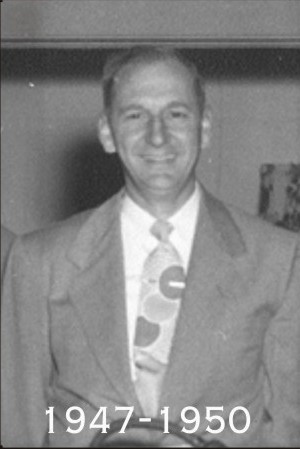 Muldraugh Hill Baptist Church met on August 31, 1947 for the purpose of calling a pastor.
Rev. John M. Wall was nominated and called with a unanimous vote. The church once again was extending a yearly call to her pastor.
Muldraugh Hill Baptist Church met on August 31, 1947 for the purpose of calling a pastor.
Rev. John M. Wall was nominated and called with a unanimous vote. The church once again was extending a yearly call to her pastor.
Shortly after his arrival on the field, a committee was appointed to make arrangements to start a Training Union Program which was finalized January 25, 1948 with Paul Payne as director and an enrollment of 123.
The church increased its outreach by sponsoring a Radio Program each Sunday morning over W.T.C.O. in Campbellsville, Ky. Porter Benningfield, Howard Farris, Donald Moore, Robert Farmer, Harold Cox, Chester Payne, Mrs. Mary Parrott, Bertha Yates, Mrs. Lottie Moore, Dorothy Jean Farris, Pauline Bohannon, Delores Rice, Betty Yates, Joyce Maupin, Elizabeth Parrott (pianist), Lorene Hardesty, Lester Farmer, Emogene Brockman, Janet Farmer, James Robert Moore, Mrs. Ada Sapp, and Mrs. Irene Maupin composed the radio choir. The radio program was discontinued with the resignation of Bro. Beard.
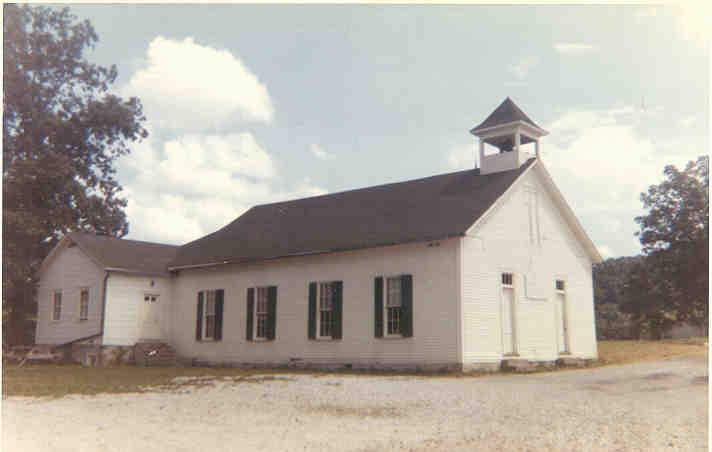 A much needed improvement of our church building at this time was Sunday School rooms. We only had curtains to divide the groups and it made it very unsatisfactory to teach and listen. Prior to this time, pastors had talked of the need for these facilities, but the church felt unable financially to build. With the leadership of Bro. Wall, interest was increased and the rooms were completed by September, 1948. A much needed improvement of our church building at this time was Sunday School rooms. We only had curtains to divide the groups and it made it very unsatisfactory to teach and listen. Prior to this time, pastors had talked of the need for these facilities, but the church felt unable financially to build. With the leadership of Bro. Wall, interest was increased and the rooms were completed by September, 1948.
The men of the church honored Bro. Wall with a new car during his ministry here.
April 2, 1950, Bro. John W. Wall announced his resignation as pastor of Muldraugh Hill Baptist Church to become effective about the first or second Sunday in May.
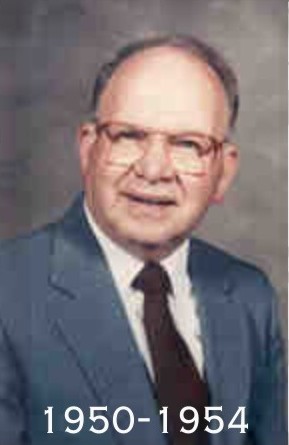 Our eighteenth pastor was William R. Beard who came on the field in June of 1950. Soon after becoming our pastor he married Frances Niceley. Their oldest daughter was born while they served here.
Our eighteenth pastor was William R. Beard who came on the field in June of 1950. Soon after becoming our pastor he married Frances Niceley. Their oldest daughter was born while they served here.
Worship services and prayer meetings were well attended and the Sunday School broke all previous records with an attendance of 376 on a homecoming day. During seasons of revival the church would often be filled to capacity with people sitting in the aisles and around the platform of the pulpit.
Bro. Beard was instrumental in starting a building fund for the Present house of worship and at the time the building was started, there was $10,000.00 in the building fund.
Rev. Beard made known his resignation January 24, 1954 to become pastor of Mackville Baptist Church in Washington County.
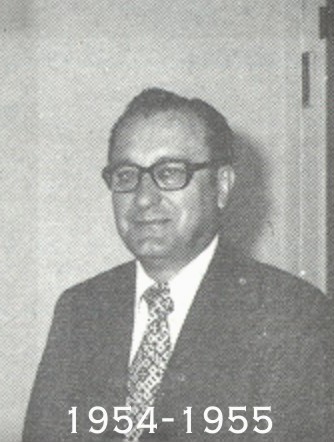 Bro. W. R. Cook succeeded Bro. Beard as pastor and was called March 17, 1954, from Younger's Creek Baptist Church in Hardin County. Bro. Cook's stay at Muldraugh Hill was brief, lasting only 10 months, and during his pastorate a budget system was first set up in September, 1954.
Bro. W. R. Cook succeeded Bro. Beard as pastor and was called March 17, 1954, from Younger's Creek Baptist Church in Hardin County. Bro. Cook's stay at Muldraugh Hill was brief, lasting only 10 months, and during his pastorate a budget system was first set up in September, 1954.
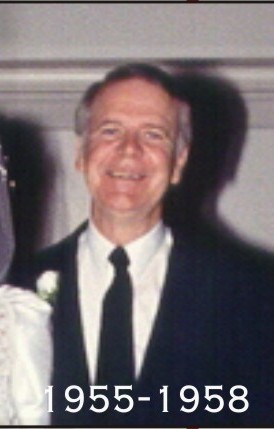 Following Bro. Cook was Rev. Kit C. Yeaste in August, 1955.
Following Bro. Cook was Rev. Kit C. Yeaste in August, 1955.
In the spring of 1947, a Woman's Missionary Society was organized with an enrollment of 14 and Mrs. Bertha Yates as President. Again the W.M.S. was reorganized on September 9, 1957 under the leadership of Mrs. Sara Yeaste. with 22 members. Mrs. A. B. Colvin helped organize and presided at this meeting. Officers elected were: Mrs. Virgie Smith, President; Mrs. Bertha Yates, First Vice President; Mrs. Mary C. Begley, Second Vice President and Program Chairman; Mrs. Esther Veatch, Community Missions; Mrs. Sara Yeaste, Missions Study Chairman; and Mrs. Louise Bright, Secretary-Treasurer.
Several auxillaries have since been added: Y.W.A (Mrs. Richard Shields) in March 4, 1959; and G.A.'s (Mrs. Betty Meers) in Jan., 1962. On September 29, 1974, Carolyn Porter and Tammy Settles received the adventure 3, which is equivalent of princess in the forward steps program. Sunbeams (Mary Frances Veatch and Marie Caulk) was organized in Jan., 1962.
Bro. Yeaste seemed to have been interested in organizing a Brotherhood, but this wasn't realized until 1962 with Steve Rice as President and Clarence Yates, Secretary-Treasurer. The Pioneers of the Royal Ambassadors was organized on Wednesday night, February 28, 1962 at Muldraugh Hill Baptist Church. David Veatch was the leader with the following 8 members: Sammie Farris, Mike Farris, Danny Farmer, Lonnie Moore, Dennis Allen, Jerry Smothers, Leon Smothers, and Ricky Yates.
During these years, under the leadership of Bro. Yeaste, the people were made aware of needy people in the community. Financial aid was given to a former pastor, (Bro. Whitlow), a free will offering was taken for a man with a terminal illness, and shoes were bought for a needy family. This has been a policy of the church as far back as records exist.
After the morning worship service of December 19, 1957, Bro. Yeaste resigned to accept a pastorate at Stanford, Ky.
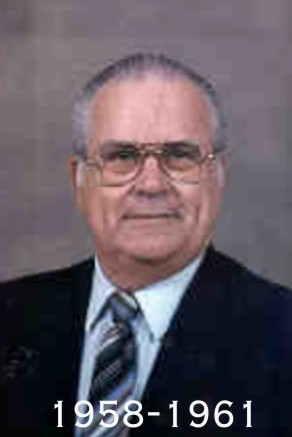 Rev. Richard M. Shields assumed his duties as pastor, March 19, 1958.
Rev. Richard M. Shields assumed his duties as pastor, March 19, 1958.
On October 4, 1958, a wet--dry election was the subject of much controversy in Marion County. In a bulletin dated July 6, 1958, Bro. Shields stated:
"Our church will be involved in a great way in the very near future, as the time arrives for the local option election in the city and county. I trust that you will make your stand for the cause of the right as you sign the petition to vote dry. You will speak louder than you have had the opportunity to speak for a long time and maybe even for a longer period of time."
Rallies were held at this church and throughout the county to boost support for the dry cause. The opposition, however, was just as determined and came out victorious in the campaign.
In order to enable more people to attend the worship services, the church purchased a bus in May, 1959 for the sum of $175.00. The bus proved very useful during Vacation Bible School. This service continued for almost two years, when, because of the expense involved in upkeep, the church felt best to sell it. Money derived from the sale of the bus was used to buy a used piano for the basement.
On May 12, 1959, a motion and second was made to go on record to build. However, prior to this time, funds had been set aside with building in mind. A survey of the membership was made in order to determine who really wanted a new house of worship and would be willing to support it financially. A building plan was adopted similar to that of Bullitt Lick Baptist Church of Shepherdsville, Ky.. At first, a basement was not included in the plans, but was added later. The colonial style, brick sanctuary with basement and education facilities was to
cost approximately $55,000.00.
In a business meeting of May, 1960, a motion was made to begin building as soon as contractors and materials could be secured. Serving as a building committee were: Carl Farmer, Leslie Brockman, Edward Benningfield, John Taylor and Bro. Shields.
In August, 1960, Muldraugh Hill Baptist Church broke ground for the erection of a new building. The oldest member, Mrs. Virgie Thompson, and youngest member, Estelle Veatch (Brady), helped Bro. Shields with the first shovel of dirt.
Money in the building fund was soon exhausted, and until a loan could be secured, Mr. Frank Caulk came to our assistance with a loan of $10,000.00. Later, $25,000.00 was secured from the Taylor County Federal Savings and Loan Association to complete the construction of the building and to repay Mr. Caulk. Within a year, the building was completed.
On Christmas Day of 1960 following the morning worship service, Bro. Richard Shields resigned as pastor to be effective January 15, 1961.
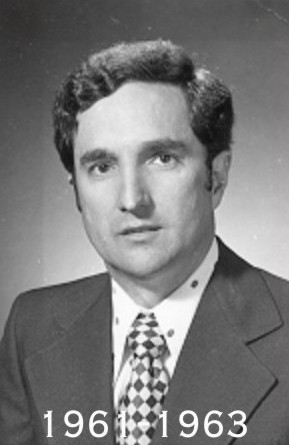 Two months after Bro. Shields' resignation, on March 19, 1961,
Harold
G. Meers of Knox Creek Baptist Church was called as pastor.
Two months after Bro. Shields' resignation, on March 19, 1961,
Harold
G. Meers of Knox Creek Baptist Church was called as pastor.
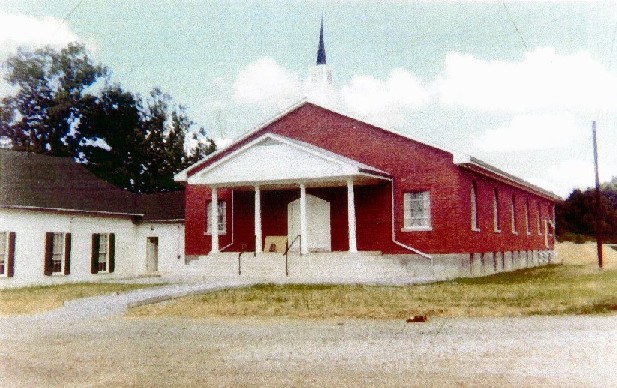 The church building had not been completed when Bro. Meers became our pastor. Within a few months, however, the building was ready for use.
The church building had not been completed when Bro. Meers became our pastor. Within a few months, however, the building was ready for use.
Dedication services were held on July 16, 1961. The dedication message was by J. Chester Badgett of the Campbellsville Baptist Church. The dedication prayer was led by the pastor and the hymn,
"Bless This House," was sung.
The responsive reading of the dedication was as follows:
Pastor: In recognition of our dependence upon and as an expression of our
love for God the Father, the Son and the Holy Spirit, we the pastor and members
of the Muldraugh Hill Baptist Church, here assembled on the 16th day of July, 1961
People:Acknowledge with gratitude, that is from the heart, Thy divine
blessings and unerring leadership through the years.
Pastor: To the glory of God by whose favor these blessings have come to us;
to the honor of Jesus, the Son of the living God, our Lord, and Saviour; to
the praise of the Holy Spirit, source of light and life:
People: We do with joy and gratitude solemnly dedicate this building.
Pastor and People: We now, the people of this church dedicate this church
together with all material, equipment and ourselves. We are Thine, use us
and the church according to Thy Holy purpose, for Thine Own Glory. Amen.
Several improvements have been added in the years since. The public address system was installed July 17, 1968, a lighted outdoor bulletin board, walks and curbing, shrubbery, steeple, and other small items such as Baptist hymnals, chairs, cabinets, etc.
On November 8, 1961, by recommendation of the deacons, the church adopted the family night plan for the various mission organizations. Family Night was to be held on the fourth Wednesday night of each month and continues to meet at that time until this day.
The New Market Presbyterian Church property was purchased by the church in the fall of 1962 for a sum of $400.00. The ground was to be used as a free cemetery and the trustees were to dispose of the old church building in the most profitable manner. The church building was sold to Charles Wright for $125.00 and the piano to Howard Farris for $15.25.
The church assumes the responsibility of the upkeep of three cemeteries. Included in these is the cemetery across the highway which was given by a Mr. Sapp to be used as a community cemetery, and the cemetery at the site of the former New Market Baptist Church.
Following is a letter of resignation from Rev. Harold G. Meers:
To My Dear Friends in Christ, of the Muldraugh Hill Baptist Church:
It is apparent to me that God wills that I go to become pastor of the Highland Park First Baptist Church of Louisville, Ky. It is for this reason that I am resigning as pastor of this church. My last Sunday with you will be February 10, 1963.,
Our time together has been short, but it has been most rewarding for the cause of Christ. Let me make it clear, I am not leaving because any-thing is wrong here, rather, it is because most things are in good order. The reason for leaving is the call to fill the great need of the Highland Park First Church.
My heart is near many of you and this place. It is not easy to leave those we love. It is not ours alone to choose, for when God calls, His ministers must follow.
I am as concerned for your welfare today as I was the day I began to work with you. My prayer is that God will lead you to a wise and able pastor.
Yours in Christ,
Harold G. Meers
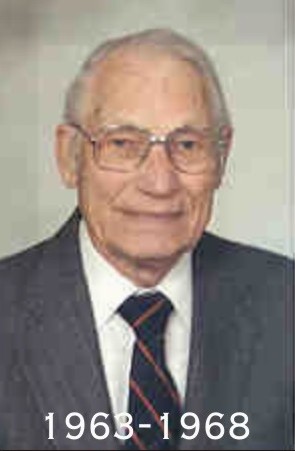 A vote taken on March 31, 1963 resulted in the call of E. V. Carrier as pastor. Bro. Carrier was instrumental in helping to retire our church indebtedness. Most of the White Christmas offering, which has been a tradition for several years, was used for this purpose.
A vote taken on March 31, 1963 resulted in the call of E. V. Carrier as pastor. Bro. Carrier was instrumental in helping to retire our church indebtedness. Most of the White Christmas offering, which has been a tradition for several years, was used for this purpose.
A bulletin dated March 13, 1966 states: Taylor County Loan was paid $3,195.00 on the building debt. This brought the debt down to $15,032.42. In another bulletin dated September 22, 1968, Bro. Carrier stated:
"At the beginning of this last year, as your pastor, I said in a prayer meeting, 'If this church will support missions around the World by giving as much as 10% of our income to mission causes, God will give us a great year.'"
This He has done, our receipts this year has gone beyond the $20,000.00 and our gift to missions has been the largest in the history of the church.
We now owe the Taylor County Loan Company approximately $2,600.00. If our offerings keep pace with the past, we are planning to have a "note burning" service on December 15, 1968.
A note burning service was held at Muldraugh Hill Baptist Church, Sunday morning, November 24, 1968, after paying the church debt. In seven years, the church was able to pay a $22,000.00 note plus interest. The church trustees had negotiated seven years ago with the Taylor County First Federal Savings and Loan Association of Campbellsville for a $22,000.00 note that was to be paid within 14 years.
"Since the building of the church, the budget has steadily grown until now the budget has reached the $20,000 a year outlay for local and mission work," said the Rev. E. V. Carrier, who recently resigned his pastorate at the church.
November 24, 1968 was the last Sunday of the pastorate for Bro. Carrier, who now is pastor of the Immanuel Baptist Church in Elizabethtown, Kentucky.
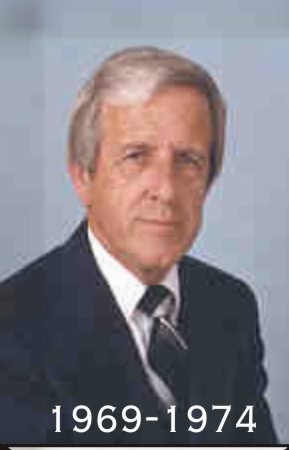 L. D. Kennedy of Campbellsville College served as interim pastor three months before our present pastor,
Rev. R. B. Hullette came on the field, March 7, 1969.
L. D. Kennedy of Campbellsville College served as interim pastor three months before our present pastor,
Rev. R. B. Hullette came on the field, March 7, 1969.
The church in a called business session, August 24, 1969, on a Sunday morning, voted by a 64 standing vote and none in opposition to proceed with breaking ground for a new pastorium. The planning and building committee consisted of Lester Farmer, Raymond England, Edward Benningfield, Sarah Brockman, and Betty Graham.
On October 14, 1969 the contract was let to G. W. Barnes, Campbellsville, Kentucky. Work began October 18th on the excavation of the basement. The new home (28 feet 8 inches x 74 feet, 8 inches) consists of a full size walk-out basement, two car garage, den, kitchen, dining room, living room, three bedrooms (one with adjoining bath) and a central bath facility. The cost was to be around $25,000. Harry B. Thompson was the architect and upon completion of the pastorium, the Hullette family moved October 5, 1970.
The former pastorium which stood near the front of the present one was purchased by Lambert Livers March 21, 1970 at a cost of $725.00. The building was moved intact to Mr. Livers' property which adjoins the church property.
Plans were discussed at length at a June, 1973 business meeting for replacing the steeple which had been destroyed by wind May 23rd of the same year. The steeple decided on at this meeting was one with a cross on top and one from which the bell of the former church building could be installed. This bell was purchased and erected for the first time in 1925 by Mr. James Farmer. The present steeple was erected October 1, 1973 by Aluminum Manufacturing Company of Greensburg, Kentucky costing $3500.00 of which $1131.06 was derived from insurance.
ALUMINUM MANUFACTURING CO. INC.
Greensburg, Kentucky 42743
W. C. Moon (Route 4 - Phone 932-5364)
Walter Wooden (Route 4 - Phone 932-7587)
PURCHASE AGREEMENT
We Muldraugh Hill Baptist Church Of Route 1 Lebanon, Kentucky 40033
Agree to purchase from Aluminum Mfg. Co. Inc. of Greensburg, Kentucky, the following as described herein:
That one all aluminum church steeple - 8 ft. by 8 ft. by 4 ft. base, 5 1/2ft. by 5 1/2 ft. by 7 ft. window section, third section 4 ft. by 4 ft. by 4 ft. with eight functional louvers, 18 ft.
spire and a 5 ft. - 38 ft. overall -- 4 colored glass windows as selected by Church - structural tower riveted and heli-arch welded at all joints, all outside covering is .032 white baked
on vinyl finish-steeple is a copy of Greasy Creek Baptist Church of Rt. 4, Greensburg, Ky. Deliver, installed and grounded Base to accomodate bell.
And furthermore agree to pay Aluminum Mfg. Co. Inc. for the above named goods as set hereforth, the sum of, $3500.00 exclusive of any applicable sales or use taxes.
Payment be remitted as follows:
one third down and balance when erected
Agreed and accepted this 12 day of June 1973.
Clarence Yates
Lester Farmer
By: Smith Mays, Jr.
Aluminim Mfg. Co. Inc., by W. C. Moon
|
The church being without a song leader, after Jerry Smothers, who held this position, moved, felt someone outside the church could better fill this vacancy. David Forman of Campbellsville, Kentucky was elected and presently fills this position.
Until 1930, a pump organ was used to accompany the congregational singing. This was the first mention of a piano in the records. In the years following, the church brought a new piano and electric organ which are in use today.
The church history includes documentation of the
Church Membership and Sunday School Enrollment from 1875 to 1973.
The church history also includes documentation of
Training Union Enrollment from 1948 to 1973 and
Women's Missionary Union Presidents and Brotherhood Presidents from 1957 to 1973.
Under the leadership of the Holy Spirit, five men from our church have been licensed to preach and four of them ordained: J. C. Raikes,
Roy Huston, Paul Payne, Chester Veatch, and J. W. Farmer.
J. C. Raikes, son of Mr. and Mrs. Perry J. Raikes was born in BradfordsvillE, Kentucky on August 10, 1908. He has four sisters, Mrs. Gene (Artie) Taylor; Mrs. Verlin (Florrie) Samples; Mrs. Damien (Estelle) Benningfield; Mrs. Paul (Juanita) Payne; one half-sister,'Mrs. Tony (Barbara) Rodriques, and a sister, Nancy, who died in 1928. He also has three brothers, Claude, Gilbert, and Eugene, who died in 1963, also two half-brothers, David and Phillip Raikes. He is married to Virginia Moore Raikes. They have one son, Glen Raikes who resides at Morehead, Kentucky. He professed faith in the Lord in autumn of 1926. He graduated from Lebanon High School; Georgetown College, Georgetown, Kentucky, and the Southern Baptist Theological Seminary in Louisville, Kentucky. Before entering the ministry, he served nine years as teacher and administrator in the public school system of Marion County, Kentucky. He announced his call to the gospel ministry, was licensed to preach in 1927 and was ordained by Muldraugh Hill Baptist Church, Lebanon, Kentucky on September 22, 1928. He was pastor of the Willisburg Baptist Church, Willisburg, Kentucky; Magnolia Baptist Church, Magnolia, Kentucky; Weaver Memorial Baptist Church, Louisville, Kentucky; First Baptist Church, Morehead, Kentucky; and Dayton Avenue Baptist Church, Xenia, Ohio. He is retired from active pastorate as of September 30, 1973 and is presently serving as interim pastor of Bellview Baptist Church, Bellbrook, Ohio. He has been active in this denominational life during his 36 years as pastor; serving as Moderator of Associations; as member of Executive Board of State Conventions of Kentucky and Ohio; served as member of Board of Child Care; Kentucky Baptist State Convention for number of years; served as Trustee of Midwestern Baptist Theological Seminary, Kansas City, Missouri, and toured the Bible lands and Greece in 1972.
Roy Edward Huston, son of the late George M. and Nellie Burnett
Huston was born in Marion County, Lebanon, Kentucky, December 19, 1919. He attended grade and high school in Marion County, graduated from Campbellsville College in 1947 and Louisville Seminary in Louisville, Kentucky in 1949. He was married to Roberta Thompson March 29, 1937, who was fatally injured in an automobile accident near Rome, Georgia, February 12, 1966.
Rev. and Mrs. Huston had five children, R. E., Fitzy, Ben, Imogene, and Betty. About five years prior to Mrs.
Huston's death, Reverend Roy Huston passed away of a fatal heart attack June 22, 1961, after suffering a first, one hour earlier while attending a Sunday School clinic at Forsyth, Georgia. He was baptized in 1930. He pastored the Salem and Friendship Baptist Church, Salem, Kentucky for three years, Gethsemane Baptist Church in Danville, Kentucky four years before going to First Baptist Church in Trion, Georgia. Roy and Roberta moved their membership to Salem Baptist Church in July 1946. It was this church which requested his ordination which was held November 28, 1945. For almost a decade, he was pastor of the First Baptist Church, Trion, Georgia. While serving as pastor there, the First Baptist Church building burned on November 25, 1956.
Reverend Huston led the church in making plans for its replacement. Bro.
Huston expressed his appreciation for our concern with this letter:
"I have never been so wordless in my life as I am in trying to express my feelings in this letter. We have received many donations from our friends and from churches around our community, but no gift has ever meant so much as the gift from my home church. Please express to the church my personal appreciation and the appreciation from the church here for this gift. I am deeply touched and I feel that it is an expression of love. I love your people and am happy that you are doing a great work there."
Roy Huston
Bro. Huston had one brother, Robert A. Huston; five sisters, Mrs. Omer
(Lyda) Caulk, Mrs. Ethel Bohanon, Mrs. Robert (Thelma) Gowan, Mrs. Steve (Elsie)
Rice and Mrs. Hall (Lillie) Newcomb. The latter two are members of our church
now.
Paul Payne, son of Will and Mary Payne was born in Marion County, Kentucky
on July 28, 1923. He has seven brothers, Howard, Lyle, Gerald, Joe, Marion, Chester, and Ronnie Payne; two sisters, Mrs. O. R. (Edith) Perkins, and Mrs. Helen Mattingly. He is married to Juanita Raikes Payne. They have one daughter, Mrs. Shelby (Mary Alice) Payne who also resides in Ohio.
He professed faith in the Lord on July 5, 1936 and was baptized into the fellowship of Muldraugh Hill Baptist Church on November 11, 1936. He attended Marion County Grade Schools, received B. A. At Georgetown College in 1952, and Master of Divinity, Southern Baptist Theological Seminary in 1956. Before entering the ministry, he was a foreman at L & N Railroad, served two years as a Paratrooper in World War II, and was a farmer at the time he surrendered to preach. He surrendered to the call to preach on August 15, 1948. He was
licensed November 28, 1948 and Ordained June 19, 1949 by Muldraugh Hill Baptist Church.
He has pastored at the Friendship Baptist Church, Casey County, Kentucky; Ottawa Baptist Church, Rockcastle, Kentucky; Blue Ash Baptist Church, Cincinnati, Ohio; First Baptist Church, Miamisburg, Ohio; and First Baptist Church, Huber Heights, Dayton, Ohio where he is presently serving.
He also served seven years as Director of Missions under The Home Mission Board in Dayton, Ohio, has served as a member of the Executive Board of Kentucky Baptists, member of the Executive Board of Baptists in Ohio, member of the Executive Committee of The Southern Baptist Convention, served as First VicePresident of Ohio Baptists, and is presently serving second term as a Member of the Foreign Mission Board of The Southern Baptist Convention. He made a preaching tour of England in 1964 and also a tour of the Middle East, including Israel in 1971.
John Wesley Farmer, son of Mr. and Mrs. Alvin Farmer, was born in Taylor County on January 20, 1925. He has three sisters, Esther, Frances, and Ruth. The latter is a member of our church now. He is married to Edna Bernice Jarboe Farmer and they have two children, a son, Lynn Edward, and a daughter, Karen Gay.
He graduated from Taylor County, Campbellsville College, Georgetown College, and also received Master of Divinity from Southern Baptist Theological Seminary, Louisville, Kentucky. He was engaged in farming in Taylor County before entering the ministry.
He professed faith in Christ in September 1936 at Muldraugh Hill Baptist Church, was called to preach when he was a teenager, but surrendered to the call in August 1948, and was ordained December 8, 1949 at South Campbellsville Baptist Church, Campbellsville, Kentucky. He has pastored Pikes Ridge 1949-1952 Taylor
County; Walnut Hill now Lowell Avenue 1952-1954 Campbellsville, Menlo 1954-1957
Menlo, Georgia; Buice Memorial 1957-1959 Atlanta, Georgia; Superintendent of
Missions 1959-1963 Bedford, Kentucky, Little Union 1963-1966 Fairfield, Kentucky; First Baptist Church 1966-1973 Irvine, Kentucky and is presently serving First Baptist Church, Carrollton, Kentucky. He served in the armed forces of our country for two years (1945 and 1946). Thirteen months was on Okinawa. He made a tour around the world June 20, 1970-July 20, 1970, visiting 15 countries. He also visited 49 states in our nation and preached revivals in Alabama, Georgia, California, Missouri, and Kentucky.
PASTOR'S COMMENT:
The pastor deeply appreciates the many hours of research and writing of our church history. Our history committee: Mrs. Edward Benningfield, Mrs. Jesse Maupin and Mrs. Lester Farmer are to be complimented for a thorough and interesting history.
I am grateful also to be pastor of a church where her members are not only rich in historical data, but rich in love, understanding, cooperation and fellowship.
In celebrating a hundred years as an organized church, one becomes involved with the thrill of a small band of people seeking for a place and creating an atmosphere for worship. One finds himself joining with the congregation in singing, praying and listening to the thundering messages of pastors--messages on God's grace, judgment, condemnation upon sin and other great doctrines of the faith. These men of God preached unflinchingly against unchristian conduct and led the church to reinforce their messages by taking immediate action to discipline her members. Many times the services began or ended in long sessions of church business.
The history, decade by decade moves along from organization with charter members and their.descendents joined by hundreds of other members uniting in one faith and purpose.
Muldraugh Hill Baptist Church has experienced periods of physical and spiritual depressions, but always followed by revival and victory.
Under the leadership of various pastors, the members of the church have cooperated and progressed toward better organization and facilities for Sunday School and Church. The church has consistantly maintained interest in worldwide missions through missionary organizations and contributions through the Cooperative Program.
The church has demonstrated a greater understanding of a pastor's role and has provided a beautiful and adequate home and better financial assistance for his needs.
Whatever progress has been made has resulted in part by members of this church who sacrifically gave of themselves in the Lord's work. Many of these have gone to be with the Lord.
May the same pioneer spirit and promptings of heart unite us in continual zeal and fellowship as we make history "Looking for that blessed hope, and the glorious appearing of the great God and our Saviour Jesus Christ." Titus 2:13
Bro. Bruce Hullette
|